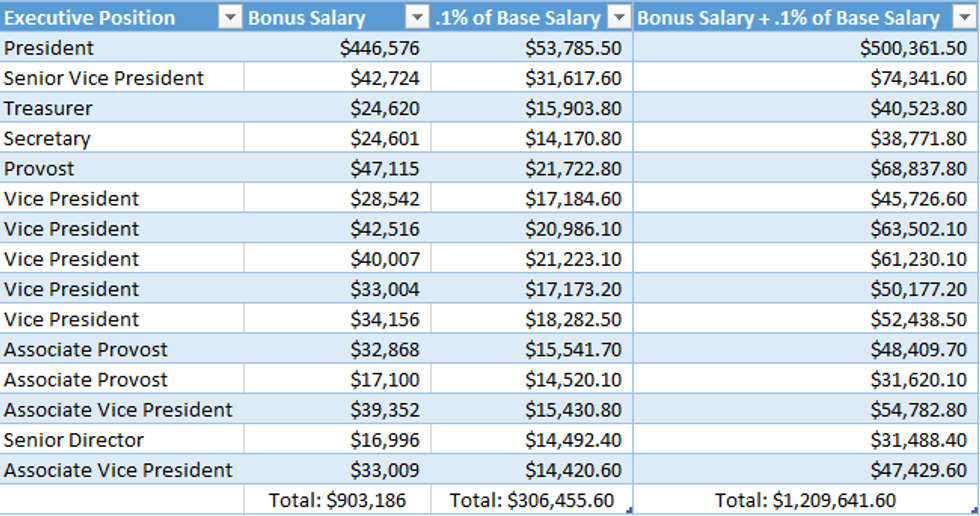In recent years, colleges have increasingly relied on adjuncts to teach the bulk of their classes, not full-time, tenured professors. From a college’s perspective, using adjuncts is cost-effective: They can pay less per class and don’t have to offer benefits, like health insurance. Half of all professors in this country are adjuncts. At Champlain College, that ratio increases to two out of three.
On average, adjuncts earn between $20,000 and $25,000 teaching, putting 31 percent below the poverty line. At Champlain College, adjuncts earn around $3,300 per class they teach, meaning the most they can make each year is $19,800. How are our professors supposed to pay back their student loans, let alone afford rent in Burlington for that kind of money?
For a $50,000 a year degree, students spend $1,150 per credit hour. If you take one student’s cost, you have the salary of the adjunct teaching the semester-long class. Where does the other students’ money go?
Turns out, the top 15 executive positions at Champlain College earn a combined $3,967,742, including bonuses. This number doesn’t even count the salaries of deans and other administrative positions. Why does a school of only 2,000 students needs so many vice presidents, deans and provosts anyway? And why are the top 15 alone paid so highly when our adjuncts are paid less than even UVM’s adjuncts, who make $6,600 a class?
Genevieve Jacobs, an adjunct at Champlain, told Vermont Digger, “We are the faculty that is directly involved in the core mission — education — of a nonprofit enterprise called college. But the current pay scale treats us like an afterthought.”
About two-thirds of my courses have been taught by adjuncts over the past three years. Overwhelmingly, I found no difference at all in the quality of my education regardless of whether a full-time professor or an adjunct taught my class. In fact, adjuncts in particular have impacted and changed me as a person for the better.
L. for example, boosted my confidence as a writer. On day one, he made me feel comfortable, allowing me to let my guard down and take full advantage of the course. A year later, he continued to keep in touch and invited me to read at his book launch. He didn’t get paid any extra to make me feel so valued and special.
M. challenged me to rethink societal norms and my place within - or without - them. She told my class the heart-breaking story or her life, and through that act, she gave me the courage to share my story with her. We met in a coffee shop because she didn’t have an office on campus. At the end of the meeting, she hugged me and I could see in her eyes how much she loved her students. For that love and for that time, she didn’t get paid any extra.
They, as well as other adjuncts, deserve enough money to stay off welfare and stand securely on their own well-educated feet. As an institution, the college can’t expect them to continue going above and beyond for us students if they don’t meet them halfway and let them know they are valued. Adjuncts deliver an essential service — education — the very core of Champlain’s mission. And yet, only 29 percent of Champlain’s expenses are used for education, only a portion of that going toward adjunct salaries.
I propose that we make salary cuts at the top – for the 15 highest paid executives – spreading that wealth to the bottom, where two-thirds of our professors have been toiling for the same low wage for the last decade.
In 2013, the top 15 executives made a base salary, plus extra compensation. If we take 10 percent of their base salaries and use 100 percent of their bonuses, $1,209,641.60 can be dispersed evenly among our adjuncts.
By adding the college executives’ bonuses and 10 percent of their base salary, 220 adjuncts teaching four classes each over the course of two semesters see their wages increase from $3,300 to $4,674.59 per class, an increase of $1,374.59.
That’s a great start, but what if we took it one step further and deducted another $1,000,000 from the executive salary pool and re-distributed it among adjuncts? That would still leave $1,758,100.40 for 15 executives, which would be $117,206.69 for everyone if split evenly — a perfectly substantial wage.
With that additional $1,000,000, adjunct salaries rise to $5,810.96 per class, an increase of $2,510.96 over their current wage. This number is still shy of UVM’s $6,600, and of the $7,000 recommended per class salary by The American Association of University Professors, but would still vastly improve upon the current situation.
This isn’t unheard of, either.
While he was the interim president of Kentucky State University, Raymond Burse gave $90,124.60 of his salary to increase the wages of the 24 lowest-paid workers on campus.
There’s really no excuse for the top 15 executives at Champlain to be making more in bonuses than our adjunct professors do in regular wages. Whether the college uses my specific suggestions or not, something needs to happen — and it shouldn't be another tuition hike. Not when only 29 percent of Champlain’s current expenses are going toward education. Not when one student’s cost for a class pays their adjunct professors’ semester-long salary.
The money is already in the budget. To lift our adjuncts up from the bottom of the ladder, it might be necessary for those at the top to take a few steps down.






















